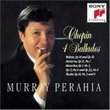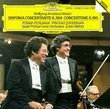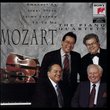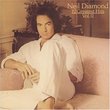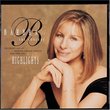| All Artists: Chopin, Rubinstein Title: Artur Rubinstein - The Chopin Collection: The Waltzes Members Wishing: 0 Total Copies: 0 Label: RCA Release Date: 10/25/1990 Genres: Dance & Electronic, Classical Styles: Historical Periods, Modern, 20th, & 21st Century, Instruments, Keyboard Number of Discs: 1 SwapaCD Credits: 1 UPC: 078635549225 |
Search - Chopin, Rubinstein :: Artur Rubinstein - The Chopin Collection: The Waltzes
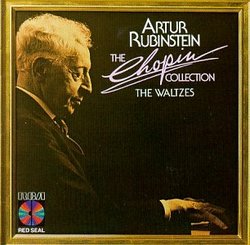 | Chopin, Rubinstein Artur Rubinstein - The Chopin Collection: The Waltzes Genres: Dance & Electronic, Classical
You just can't listen to this music without feeling good. These waltzes--aside from containing some of the most famous tunes ever written for the piano--are so lovely, so toe-tappingly appealing, so perennially fresh sound... more » |
Larger Image |
CD DetailsSynopsis
Amazon.com You just can't listen to this music without feeling good. These waltzes--aside from containing some of the most famous tunes ever written for the piano--are so lovely, so toe-tappingly appealing, so perennially fresh sounding (even the Minute Waltz) that you won't believe they're more than 150 years old. They sound like they were composed yesterday. A lot of the credit for this belongs to Rubinstein, who plays them with such grace and naturalness that you're hardly even conscious of a human being at the keyboard. The music seems to float effortlessly from Chopin's fertile imagination right into you heart and mind. It's so lovely it's almost embarrassing. --David Hurwitz Similarly Requested CDs
|
CD ReviewsThey don't play 'em like this any more Eric Krupin | Salt Lake City, UT | 10/30/2006 (5 out of 5 stars) "Barry De Boer's review below is obviously knowledgeable - but I feel he has missed the forest for the trees. Maybe a Juilliard student would be concerned whether Rubinstein is using the Debussy edition here or not. But I certainly don't - and I doubt whether any one else consulting these reviews will either. What they *will* care about, I suspect, is whether the playing will deliver that sense of being transported back to a 19th century salon [where George Sand is flicking her cigar ash in the pianoforte, no doubt] that someone in the market for the Chopin waltzes would be looking for. The answer is: Oh my goodness, yes. Rubinstein was one of the last survivors of the Golden Age of Pianism, and he brings an aristocratic feel for this music that today's competition technicians - for all their chops and digital sound - can only mime. Dinu Lipatti's performance of these pieces has its cult, and I'll grant it has a genuine youthful charm beneath its dim, boxy recording. But to my mind there's no comparison. This is a mature performance by one of the universally-acknowledged master Chopinists, presented in soft-edged but easy-on-the-ears 50s stereo. You don't need to bother with any of the others." Nearly the best Barry De Boer | Huddersfield, West Yorkshire United Kingdom | 07/21/2000 (3 out of 5 stars) "In the 60's there were two choices for the Watzes, Lipatti and Rubinstein. Learned philosophers, music critics and brain surgeons spent hours debating the relative merits over their coffees. Upstarts came along like Cziffra (good but not good enough,) Ashkenazy (misses the point too often,) Lipatti's last Besancon recital (historically important but not complete and the G-flat was a disaster by his standards,) and the "new" Rubinstein recording reviewed here. Recording quality was much superior, the maestro was in superb technical form (for him) and the clarity and sense of joy were as present as ever, BUT....he had a problem with the key of A-flat major! Not a technical problem, mind. More a willful decision to make it different. Take the little No.9 in A flat, "L'Adieu". Some folks say he is using the Debussy edition, others say he was bored with it and changed it, not dramatically, but just enough to stop it being definitive. Now take the Opus 42 in the same key. The changes here are very dramatic - a consistent error/modification to part of the text and enough to make me use the program buttons on my CD player to leave it out! The rest is magic! A best ever C sharp minor, for example. What a shame, nearly the best - but do listen if you get a chance"
|

 Track Listings (14) - Disc #1
Track Listings (14) - Disc #1

